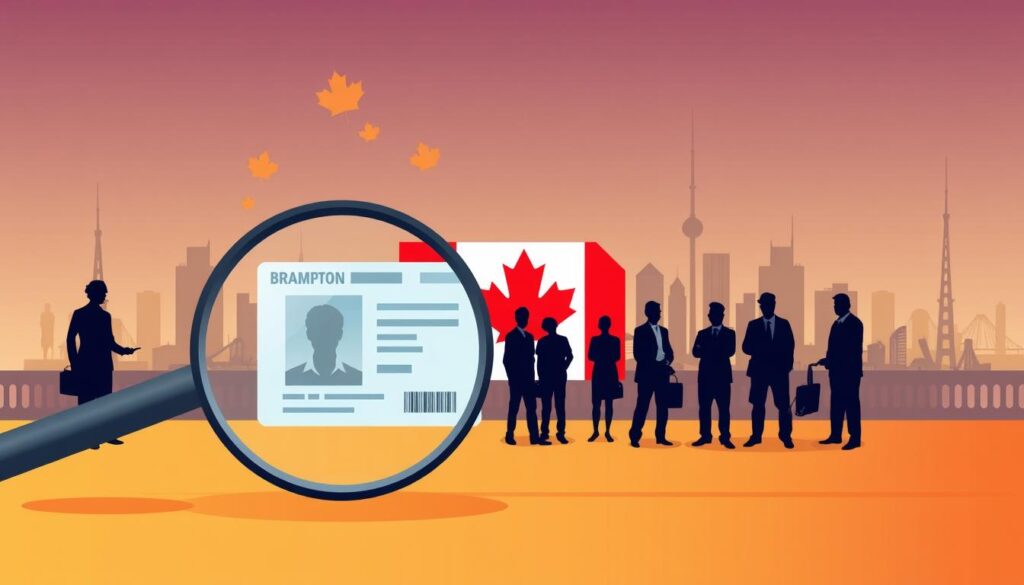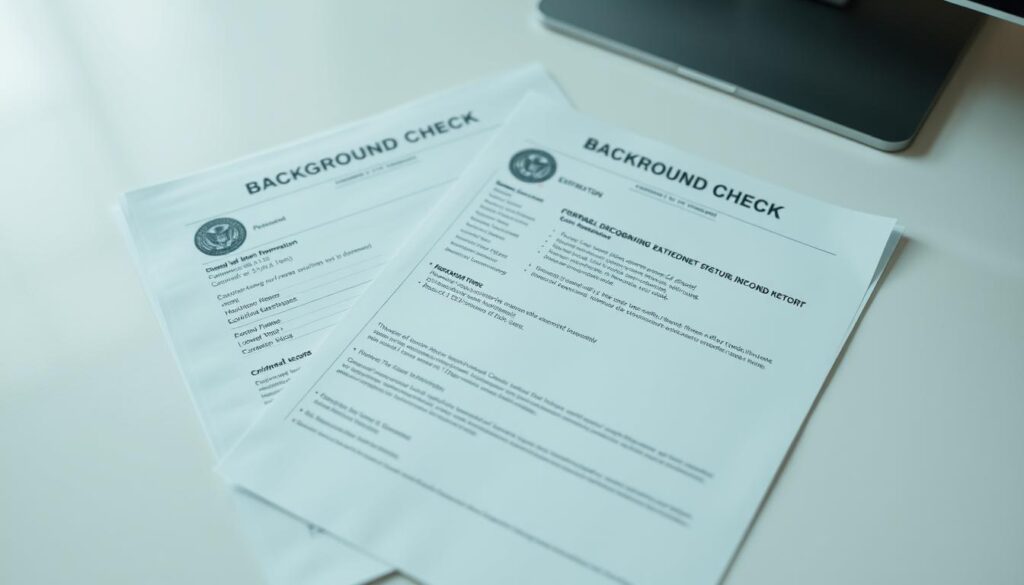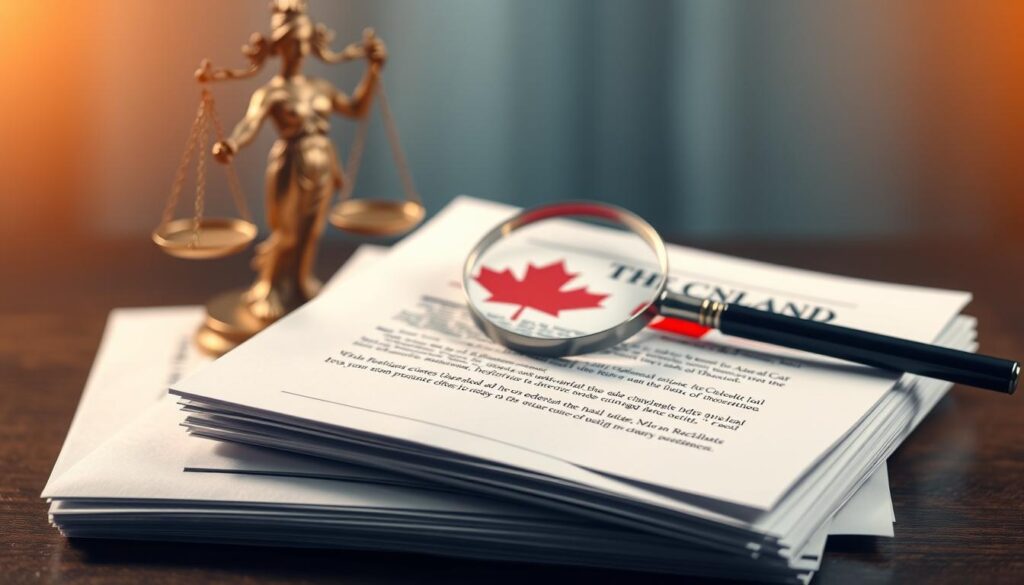Did you know over 3 million background screenings are processed yearly across Canada? These verifications shape opportunities for employment, volunteering, and housing access. In Brampton, navigating this process requires understanding Canada’s strict legal framework, designed to balance safety with individual rights.
Ontario’s Police Record Checks Reform Act, 2015 outlines three main types of screenings: criminal record checks, judicial matters reviews, and vulnerable sector searches. Each serves distinct purposes, from standard job applications to roles involving children or elderly care. Employers and organizations rely on these tools to build trust while respecting privacy laws.
You’ll learn how these processes protect communities without compromising personal freedoms. Modern systems now allow online submissions, reducing wait times compared to traditional paper-based methods. This shift ensures quicker results for time-sensitive opportunities.
Choosing accredited providers guarantees accuracy and compliance with provincial regulations. Whether you’re applying for a new role or volunteering locally, proper documentation strengthens your credibility. Let’s explore how to navigate this essential step confidently.
Understanding Police Checks in Brampton and Canada
In Canada, background verifications are more than administrative steps—they’re safeguards built on precise laws. The Police Record Checks Reform Act, 2015 creates clear rules for what information gets shared, ensuring fairness nationwide. This system helps organizations make informed decisions while respecting your privacy rights.

Three Levels of Protection
Standard criminal record checks reveal convictions and Youth Criminal Justice Act outcomes. These form the baseline for most employment screenings. Positions needing deeper insight require criminal record and judicial matters checks, which add discharges, active warrants, and court orders.
Specialized Security Layers
Roles involving children or at-risk groups demand vulnerable sector checks. These include mental health adjudications and pardoned sexual offenses. By law, non-conviction data appears only when specific risks exist. Choosing the right service ensures compliance while protecting sensitive details.
Accredited providers follow these tiers precisely. Whether you’re coaching soccer or applying for a bank job, matching your needs to the correct check type saves time and builds trust. Canada’s framework balances transparency with dignity—a model other countries often emulate.
Types of Police Record Checks in Canada
Canada’s background verification system uses tiered security measures tailored to different responsibilities. Three distinct levels help organizations assess risks while safeguarding individual rights. Each serves unique purposes across industries, from education to healthcare.

Criminal Record Check Details
A standard criminal record check reveals convictions where no pardon exists. It also shows Youth Criminal Justice Act findings during their disclosure period. This basic screening suits most entry-level jobs or volunteer roles.
Time limits protect applicants’ privacy. Absolute discharges vanish after one year, while conditional ones clear after three. Employers receive only relevant, current data for fair assessments.
Judicial Matters and Vulnerable Sector Checks Explained
Judicial matters checks add layers beyond convictions. They flag active warrants, court orders, and unresolved charges. This helps organizations evaluate risks in finance or supervisory positions.
Vulnerable sector checks go further, including pardoned sexual offenses and mental health rulings. Non-conviction details appear only if they meet strict Section 10 criteria. As one legal expert notes: “These checks balance safety with dignity—disclosing only what’s essential for protecting vulnerable groups.”
Specialized roles with children or seniors require this highest-level screening. Information older than five years gets automatically excluded, ensuring outdated issues don’t block opportunities unfairly.
How to Apply for Your police check brampton
Modern applicants benefit from streamlined systems that simplify obtaining essential screenings. Whether you need verification for employment or volunteering, three main methods exist: digital platforms, physical submissions, or authorized third-party services.

Online Application Process and Steps to Follow
Digital platforms let you complete the entire process from home. Start by entering personal details like birthdate and current address. Upload scans of government-issued ID, then take a live selfie for identity confirmation.
One user shared: “I received my basic criminal record results in 15 minutes—faster than brewing coffee!” Note that complex cases with pending charges may take up to 72 hours. Always double-check entries to avoid delays.
Required Identification Documents and Information
Prepare these documents before starting:
- Valid driver’s license or passport
- Proof of address (utility bill or bank statement)
- Social Insurance Number (optional for some checks)
Ensure all information matches your official records exactly. Mismatched names or outdated addresses can pause your application. Third-party providers handle standard screenings, but vulnerable sector checks require direct police service involvement.
Processing times vary based on screening depth. Basic checks often finish same-day, while comprehensive reviews need longer verification. Accurate submissions help maintain Canada’s trusted security framework.
Understanding the Application Process and Results
Background screenings act as gateways to opportunities across Canada. Modern systems deliver clarity through three distinct outcomes, each shaping your next steps. Let’s break down how this works from submission to final report.

Steps Involved in Completing Your Background Check
Begin by selecting your required screening level through accredited platforms. You’ll provide:
- Full legal name and birthdate
- Current address history
- Digital copies of government-issued ID
Automated systems cross-reference national databases instantly. One applicant noted: “The process felt secure—like unlocking doors without handing over keys.” Complex cases involving similar names may require fingerprint verification for accuracy.
Interpreting Negative, Positive, and Incomplete Results
A negative result means no criminal record matches your details. This green light suits most employment needs. Positive outcomes occur when declared convictions align with database findings.
Incomplete reports signal potential matches needing manual review. As one expert explains: “This safeguard prevents false associations—protecting both organizations and individuals.” You’ll receive instructions for fingerprint submission if needed.
Results reach you first, ensuring privacy before sharing. Modern services deliver standard checks in 15 minutes, while complex histories take up to 72 hours. Always review your report thoroughly—outdated or incorrect data can be challenged through official channels.
Key Documents and Information Required for a Background Check
Proper documentation forms the backbone of every reliable screening process. Canada’s verification systems demand precise identity confirmation to maintain security standards while protecting applicant rights. Let’s break down what you need to prepare for a smooth experience.
Essential Documentation Guidelines
Start with government-issued photo ID like a driver’s license or passport. These documents verify your identity against national databases. You’ll also need to provide:
| Document Type | Standard Check | Vulnerable Sector Check |
|---|---|---|
| Proof of Address | Required | Required |
| Birth Certificate | Optional | Mandatory |
| Organization Letter | Not Needed | Required |
Special roles involving children or seniors require extra steps. Employers must submit letters detailing your responsibilities and agency codes. Fingerprint verification becomes mandatory when standard ID methods can’t confirm your details.
Always specify your screening purpose—employment, volunteering, or licensing. This determines which databases get searched. One legal advisor notes: “Accurate documentation prevents delays and ensures results match your needs exactly.”
Canada’s system automatically excludes outdated information older than five years. This balance between thoroughness and privacy keeps screenings fair while maintaining community safety standards.
Trust, Security and the Canadian Legal Framework
How does Canada ensure fair background screenings while guarding your sensitive data? The answer lies in Ontario’s Police Record Checks Reform Act, 2015. This legislation creates ironclad rules for handling personal histories, prioritizing both community safety and individual dignity.

Legislative Standards in Ontario’s Police Record Checks Reform Act
The law strictly limits what details appear in your results. Non-criminal mental health interactions remain confidential, removing stigma from seeking help. As one privacy advocate states: “Your crisis call shouldn’t block future opportunities.”
Three key protections stand out:
- Youth records stay sealed from employers
- Victim/witness status never gets disclosed
- Outdated court orders vanish after set periods
How Your Privacy and Identity Are Protected
You control who sees your information. Results first come to you for review before any organization receives them. Found errors? The Act provides formal channels to challenge inaccuracies within 30 days.
Special exemptions exist only for:
- Firearms license applications
- Child custody evaluations
- International adoption processes
This framework ensures screenings protect communities without sacrificing personal rights. By requiring explicit consent for each disclosure, Canada maintains trust in its verification systems while stopping misuse of sensitive data.
Service Providers and Easy Online Background Check Platforms
Digital innovation has transformed how Canadians access essential screenings. Modern platforms now offer secure alternatives to in-person requests, combining speed with rigorous security standards. These services streamline the process while maintaining compliance with national regulations.
Comparing Leading Service Providers
Globeia stands out among RCMP-accredited agencies with its 15-minute results for basic criminal record checks. Unlike some competitors, their platform integrates fingerprint verification and document notarization in one system. See how major providers stack up:
| Service Provider | Basic Check Cost | Turnaround Time | Accreditation |
|---|---|---|---|
| Globeia | $33.90 | 15 minutes | RCMP-approved |
| Competitor A | $49.99 | 2 business days | Regional only |
| Competitor B | $41.50 | 24 hours | No national coverage |
Speed and Value in Modern Screenings
Online services slash waiting periods dramatically. While traditional methods take days, platforms like Globeia deliver standard checks faster than most pizza deliveries. Their fingerprint-based options start at $130 CAD – crucial for immigration or licensing needs.
Key benefits include:
- 24/7 access from any device
- Nationwide coverage across 10 provinces
- Mobile fingerprinting units in major cities
Remember: Vulnerable sector screenings still require direct contact with local law enforcement. As one user reported: “I completed my employment check during my lunch break – no time off needed!”
Always verify a provider’s accreditation status before submitting sensitive data. Reputable agencies display certification badges prominently, ensuring your information stays protected throughout the process.
Why Choose a Professional Background Check Service in Brampton
Securing accurate screenings builds trust in professional and personal relationships. Accredited services simplify complex processes while ensuring compliance with Canada’s privacy laws. This peace of mind proves invaluable when timelines matter.
Client Experiences and Testimonials
“The team caught a name mismatch that could’ve delayed my job offer,” shares Ravi K., a recent tech sector applicant. Professional providers cross-reference databases thoroughly, reducing errors in criminal history reports. Many users highlight how specialists explain each step of the screening process clearly.
Local organizations often recommend verified services for volunteer support applications. Sarah L., a community coordinator, notes: “Their efficiency helps us onboard helpers faster without compromising safety checks.” Real-time tracking and encrypted document handling add layers of security missing from DIY methods.
Choosing experts familiar with Brampton police protocols ensures region-specific requirements get met. Faster turnaround times and dedicated support turn a stressful task into a streamlined experience. Your next opportunity deserves this level of precision.

